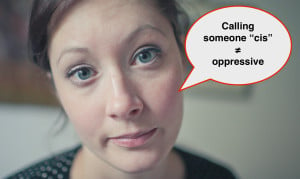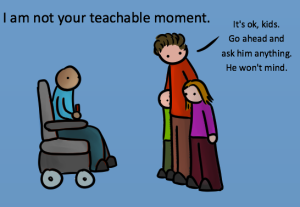“When you’re a kid, they tell you it’s all: Grow up. Get a job. Get married. Get a house. Have a kid, and that’s it.
But the truth is, the world is so much stranger than that. It’s so much darker. And so much madder. And so much better.”
–Elton, from Doctor Who episode “Love and Monsters”
I’ve never heard truer words spoken.
And for those of us who are aromantic (an orientation comprised of a complete lack of romantic interest, behaviors, and relationships), we understand it in a unique way that many romantic people don’t often get to uncover.
The truth is that we’ve all been living under a cloud – choking on it – and hardly anyone else seems to notice it. It’s insidious, and it’s made a complete mockery of friendship and other forms of intimacy outside of romantic entanglements.
It’s so bad that even in the non-monogamous community, aros (a shorter name for aromantic people) are looked at strangely.
This toxic cloud is called amatonormativity – and it’s terribly harmful.
Amatonormativity is, essentially, “the assumption that a central, exclusive, amorous relationship is normal for humans, in that it is a universally shared goal, and that such a relationship is normative, in the sense that it should be aimed at in preference to other relationship types,” according to Elizabeth Brake.
That is to say, it’s the relationship escalator everyone tends to ride: fall in love, move in together, get married, have kids, and forsake all (or at least most or many) others.
Anyone who doesn’t want those things, or who wants to do things like that (except for the falling in love bit) with their friends, family, or platonic lovers is considered defective.
The fact that I never wanted to marry, that my sis and I raise our kids together regardless of who we’re involved with, and that I want to live in a house with all of my friends strikes people as very, very weird.
At first glance, the relationship escalator and amatonormativity might not seem so terrifying for people besides aros. But I’ve got five oft-unexplored social side effects to share with you.
1. Amatonormativity Creates an Arbitrary Relationship Hierarchy
It’s built right into the definition.
It’s such a common thought that people automatically pair bond for the duration of their lives, that this pair bond is best supported by a romantic framework, and that this is natural and right for every single person to want.
And then non-monogamous people, in particular those that consider themselves polyamorous, simply extend this romantic and pair-bonding framework to include several other people.
Not only does this instantly exclude those who simply or primarily prefer sexual relationships, it makes deviants of everyone who values their family, friends, or selves more than their theoretical romantic possibilities.
It’s expected that you grow out of things like intimate friendships. It’s expected that you one day want to get married. It’s expected that you want to entangle your life closely with a romantic partner.
It is perfectly acceptable to place a romantic partner above all other relationships in your life, for no other reason than that you have romantic feelings for them. It’s the norm to rearrange your entire life, make all of your plans, and do whatever it takes for a romantic partner based on simply having romantic feelings.
Love is often compared to a form of addiction, and when aros see the lengths romantic people will go to in order to secure romantic love, it can certainly seem like one.
No other relationship in your life gets the recognition, legal, social, and emotional support than a romantic one.
You only have to look as far as the existence of things like the “friend zone,” “bromance,” and the platonic, but pejorative “gal pal” to understand exactly what the majority of romantic people tend to conceive of as friendship.
Heteronormativity adds its own oppressive layer right on top of this uncomfortable romance supremacy. Men and women can’t seem to be friends with each other without some sexual or romantic overtones or assumptions.
And then you have the statement “I married my best friend,” which aromantics find offensive because it excludes any close bond outside of romance.
Romantic people who choose to form families or bonds with their best friends or siblings are made to feel like there’s something wrong with them, especially if they’re not sexually or romantically attracted.
Some therapists refer to any partnership that isn’t romantic in nature as being unhealthy or childish.
Fortunately, many aros are coming to understand that this doesn’t have to be the case, and we want you to know that.
We deliberately form companionate friendships. We love consummately in ways the Triangular Theory of Love misses. We are reclaiming the entire friendzone for ourselves, from the damage that romance supremacy has done to it.
Once you start looking for the not-so-subtle signs, you see the many ways romance supremacy is embedded into the very roots of our societal structure. It’s literally supported from the ground up, so of course the insidious side is harder to see for anyone who isn’t already at the edge of it in some way.
So why don’t more people recognize this belittling hierarchy of relationships exists, with romance as the only moral, superior, and mature option? Why don’t they see the damage affects everyone?
Well…
2. Amatonormativitiy Discourages Communication and Compatibility
By this, I mean that the majority of people receive a rather awful education about forming healthy relationships, boundaries, and sense of self. Relationship advice mostly consists of citing that the two most widely recognized sexes are opposites and must basically one-up each other to “win.”
In the end, it leaves us all losers.
Romance is depicted as competitive. Exclusive. Jealous. Restrictive and controlling. Ownership. All-consuming. Normal.
That’s the message that gets pounded into all of us day after day, the same message we’ve been hearing over and over for thousands of years, even though it’s been conflated with marriage only recently.
So much of our toxic relationship lessons come from the content we consume: our media. Movies, literature, and TV all thrive off of sex and romance.
When’s the last time you really saw a healthy relationship (or communication) depicted on TV or in a book? When’s the last time you saw the hero pick their friend over their lover? When’s the last time a “love triangle” (which, in actuality is not a damn triangle, but a V) wasn’t simply a plot device?
But don’t we need those intense dramatic love stories to make our tales interesting?
Truth is, we really don’t.
Truth is, plenty of us, aros or not, want content tailored to a wider variety of possibilities: where adult friendship is valued; where lovers don’t get married and have kids; and where intimacy, sex, and sensuality isn’t inextricably bound up with romance.
It’s another reason I started writing my own fiction, because I was sick of the toxic ways love was often conceived of in literature.
Aros are likely to realize a bit sooner that having only one important, centralized, and exclusive bond isn’t the be-all or end-all. Not all of us are non-monogamous, though much of behavior and relationship structuring certainly has more in common with Relationship Anarchy and polyamory than with traditional monogamy.
But…
3. Amatonormativity Also Makes Non-Monogamy More Difficult
Something strange happened when I discovered the polyamory community.
Here, I found other people who also realized that having one single partner didn’t have to be the only option. I was excited to meet people I thought were like me.
That is, until nearly everything I was reading discussed hierarchies, jealousy, and the weirdest effort to distance themselves from sexuality.
The vast majority of information for non-monogamous populations is still heavily couple-centric, hetero- and cisnormative, ableist, and virtually completely romantically oriented.
Hence, the most popular issues being discussed aren’t the ones most aros (or those for whom polyamory is their orientation) actually encounter. They’re not even issues inherent to being polyamorous or non-monogamous!
The common problems surrounding jealousy versus compersion, transitioning into non-monogamy, or the whole debate about to marry or not to marry have nothing to do with being polyamorous or non-monogamous.
In reality, compersion (the feeling of joy that one partner gets when one of their partners is happy, usually because they’ve met someone new) is already a quite natural and normal occurrence in nearly any other type of relationship or situation. Yet romantic people have been made to think that it takes effort to inject it in romantic contexts.
Couple privilege and other sorts of unhealthy power dynamics are supposedly dismantled within solo polyamory specifically. Yet aros are not considered solo polyamorous if we happen to have nesting partners, kids, or otherwise have friendships that resemble more commonly practiced forms of enmeshment – regardless of whether or not couple privilege is actually present.
We tend to get kicked out of the solo polyamory club all because aromantic identities are so easily erased, because people can only see through the romantic lenses that amatonormativity forces on them.
On a related point, the entire discussion around jealousy ignores aromantics’ experience entirely. I happen to be one of those people who literally does not experience much jealousy, and absolutely never over something like an intimate partner.
The “non-jealous polyamorous person” is as mythical within polyamory as the “hot bi babe.”
And yet, here I am.
However, when it comes to relationships, aromantic people are actually more likely to lose valuable friendships and bonds. This is where romance supremacy hits us particularly, and in a big way: People literally leave us for their romantic partners.
Unlike the general insecurities and sense of ownership that accompanies and feeds the toxic form of jealousy, for aros, the fear of losing people we love is actualized repeatedly, throughout the duration of our lives.
It’s such an issue that some aros refuse to ever be friends with romantic people period, even though it’s just the way they’ve been taught to behave.
And then it just gets worse.
4. Amatonormativity Leaves Aros, Asexuals, and Others More Vulnerable
I happen to be asexual, autistic, aromantic, and kinky – as well as left-handed. All of this leaves my brain wired extremely differently to most.
And a lot of romantic dating culture revolves around not being blunt, open, and upfront. It’s been pointed out before that the vanilla dating scene is actually extremely dangerous, and it only worsens when your identity is also non-normative in other ways.
When we don’t speak romo (don’t understand romantic culture), we can end up in situations where we’re more likely to be pressured into unwanted romantic or sexual situations and worse.
When we go searching for sexual partners, we’re unlikely to find many that value the “friendship” part of sexual friendship.
If we want to have sex, we have to deal with sex-shaming if we happen to be read as female, and abandonment once we go through with it.
If we desire sensuality and intimacy with friends, we have to deal with jealous partners, strict romantic-based sensual boundaries, and abandonment once they find a suitable romantic partner.
As we grow older, the outside pressures to conform and seek out some sort of romantic relationship grow as well.
The medical community mostly thinks something’s wrong with us if we don’t want a romantic relationship. The majority of people we meet will conflate all love, intimacy, and affection with romance. And hoping to have our needs met consistently and appropriately will likely remain only a hope for many of us.
Sometimes aros, aces, and Aspies may compromise in order to have some of their needs met. Or they may choose to try the romantic path because they don’t yet realize they’re aromantic or asexual.
It’s more likely they’ll end up pissing off many romantic-sexual people for “being a tease,” for “being cold,” or for “being afraid of commitment.”
Amatonormativity ends up separating the neurodivergent, aros, and asexuals from romantic people. It keeps us apart and makes it difficult to understand one another.
Instead of educating, engaging with, and even partnering up with one another, we’re turned into opposites, akin to the ways men and women are considered opposites.
While this pretty much sucks all on its own, each of the previous points feed into one super big problem with amatonormativity, and that is this:
5. It Leaves Parts of Abuse Culture Intact
Without questioning conceptions of love, without an intersectional approach to marginal experiences, without understanding the context of human history, all of us are left floundering when it comes to love, intimacy, and affection.
Intimate partner violence is so common. So fucking common. It is an everyday reality that so many people live with. It happens so often that pretty much everyone has either been in a relationship with an abusive partner or knows someone who has.
And yet, toxic ideas of romance are still placed upon a pedestal without any critique, any analysis, without any genuine questioning at all.
When a romantic relationship has become the most dangerous and most likely experience you’ll have in your life, what does that say about the culture you live in?
Do you really think it’s okay for us to be pressured to chase this sort of love at all costs when it’s demonstrably full of risks?
Amatonormativity pressures people to sacrifice, to place the relationship above the consent of the people involved in it, to treat love as a limited resource rather than an experience.
It overlooks incompatibility, practicality, and diversity. It erases identities. It encourages addictions, rather than reflections. Amatonormativity is the notion that love is blind, which, on top of being ableist, also plays out in a very nefarious way: namely, that abuse is swept under the rug.
Because it says that if they love you, they can’t hurt you.
Because if you love them, you can’t leave.
Because all you need is love.
Because you can’t give up on your soulmate.
Behaviors, dynamics, and situations that would be considered abusive, inappropriate, and toxic are so regularly, necessarily, overlooked within romantic culture.
***
Amatonormativity has so poisoned ideas of romance and love that some aros, including myself, are repulsed by any notion of romance at all. It’s difficult to see anything redeeming in the toxic romance culture that actively mocks all other bonds – even healthy romantic ones!
Fortunately, I’ve met romantic people that prove romance itself isn’t the problem, but we can all do more to make it better.
And until we, romantic people especially, start holding ourselves accountable for perpetuating romance supremacy; until we acknowledge that romantic relationships come with many forms of privilege; until amatonormativity is rooted out from true and wholesome romance; avoidable abuses, division, and erasure will continue to be widespread.
Love and romance are and can be some of the greatest experiences in life. Isn’t it time we took it back from the toxic poison of amatonormativity?
[do_widget id=’text-101′]
Michón Neal is a Contributing Writer and Social Media Associate for Everyday Feminism. Ze has so many identities they won’t fit here. Michón writes a mix of scifi, fantasy, erotica, and autobiography called cuil fiction about unique people in unique circumstances, with characters running the gamut of non-monogamous and LGBTQIA+ spectrums. That’s right: queer and poly fiction! Ze is currently working on the Cuil Effect project, a ridiculously long tale about healing, absurdity, and all the different ways people interact. You can find more details, sneak peaks, links, and absurdity on hir blog, Shadow in the Mirror. Michón also invented the only class on Intersectional Non-Monogamy and is the co-editor for Postmodern Woman.
Search our 3000+ articles!
Read our articles about:
Our online racial justice training
Used by hundreds of universities, non-profits, and businesses.
Click to learn more





















